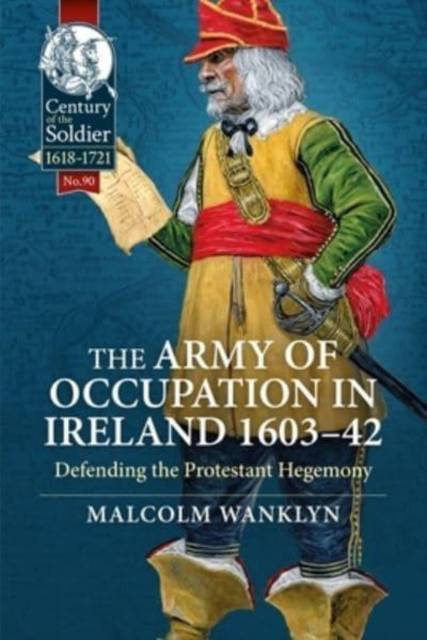
- Afhalen na 1 uur in een winkel met voorraad
- Gratis thuislevering in België vanaf € 30
- Ruim aanbod met 7 miljoen producten
- Afhalen na 1 uur in een winkel met voorraad
- Gratis thuislevering in België vanaf € 30
- Ruim aanbod met 7 miljoen producten
Zoeken
€ 48,95
+ 97 punten
Omschrijving
Established in 1603 and initially composed almost entirely of English officers and soldiers for the first thirty years of its existence, the army's strength waxed and wanes in accordance with the English government's assessment of the security situation in Ireland. However, during the governorship of Thomas Wentworth it was seen as a possible instrument for enforcing royal rule in all three of the Stuart kingdoms. In 1640, some 8,000 strong, it was geared up for a campaign against Charles I's rebellious Scottish subjects, but it never left Ireland as by the time it was ready to do so the Scots had defeated the king. It was then reduced to a third of its previous strength, but it lost almost a quarter of its infantry in surprise attacks during the first few hours of the Catholic uprising in late October 1641. The remainder were nevertheless able to hold onto the principal ports until reinforcements arrived from England and Scotland in the following spring.
For the first thirty years of its existence and in the eighteen months prior to the uprising the standing army was under-resourced because of a struggle between the English government and the government in Dublin as to who should be responsible for maintaining it. As a result officers and soldiers received very little pay and the defenses of even the most important garrisons fell into disrepair. Another consequence was that the supply of recruits from England via impressment ended in 1625, and it is scarcely surprising that Irish soldiers many of whom were Catholics were used by commanders to fill up their units' ranks. These factors help to explain the disasters that occurred on the night of 23 October 1641, but so also does the deployment of the troops and companies in penny numbers in all parts of Ireland - a sensible deployment of an army of occupation in time of peace for putting down minor unrest but disastrous when faced with a major rebellion that came out of the blue. Finally, there are straws in the wind that English Protestant soldiers stationed for years in the same place were becoming too chummy with the Catholic population through marriage or through economic necessity as they had recourse to their civilian skills as laborers and craftsmen in order to make ends meet, and that this created divided loyalties in 1641. Living cheek by jowl may also help to explain a surprising lack of tales of gratuitous acts of violence by army personnel against civilians. Absence of evidence is not, of course, evidence of absence, but criticism of this kind of behavior does not appear in the lists of grievances sent by the leaders of the Catholic Irish to Kings James and Charles. Instead they largely focused on behavior of an army of occupation under control such as collecting fines levied by the law courts and unpaid taxes and requisitioning food when marching from one garrison to another and then failing to initiate the process by which farmers or shopkeepers were paid.
For the first thirty years of its existence and in the eighteen months prior to the uprising the standing army was under-resourced because of a struggle between the English government and the government in Dublin as to who should be responsible for maintaining it. As a result officers and soldiers received very little pay and the defenses of even the most important garrisons fell into disrepair. Another consequence was that the supply of recruits from England via impressment ended in 1625, and it is scarcely surprising that Irish soldiers many of whom were Catholics were used by commanders to fill up their units' ranks. These factors help to explain the disasters that occurred on the night of 23 October 1641, but so also does the deployment of the troops and companies in penny numbers in all parts of Ireland - a sensible deployment of an army of occupation in time of peace for putting down minor unrest but disastrous when faced with a major rebellion that came out of the blue. Finally, there are straws in the wind that English Protestant soldiers stationed for years in the same place were becoming too chummy with the Catholic population through marriage or through economic necessity as they had recourse to their civilian skills as laborers and craftsmen in order to make ends meet, and that this created divided loyalties in 1641. Living cheek by jowl may also help to explain a surprising lack of tales of gratuitous acts of violence by army personnel against civilians. Absence of evidence is not, of course, evidence of absence, but criticism of this kind of behavior does not appear in the lists of grievances sent by the leaders of the Catholic Irish to Kings James and Charles. Instead they largely focused on behavior of an army of occupation under control such as collecting fines levied by the law courts and unpaid taxes and requisitioning food when marching from one garrison to another and then failing to initiate the process by which farmers or shopkeepers were paid.
Specificaties
Betrokkenen
- Auteur(s):
- Uitgeverij:
Inhoud
- Aantal bladzijden:
- 258
- Taal:
- Engels
- Reeks:
Eigenschappen
- Productcode (EAN):
- 9781915070364
- Verschijningsdatum:
- 29/09/2022
- Uitvoering:
- Hardcover
- Formaat:
- Genaaid
- Afmetingen:
- 178 mm x 248 mm
- Gewicht:
- 594 g

Alleen bij Standaard Boekhandel
+ 97 punten op je klantenkaart van Standaard Boekhandel
Beoordelingen
We publiceren alleen reviews die voldoen aan de voorwaarden voor reviews. Bekijk onze voorwaarden voor reviews.











